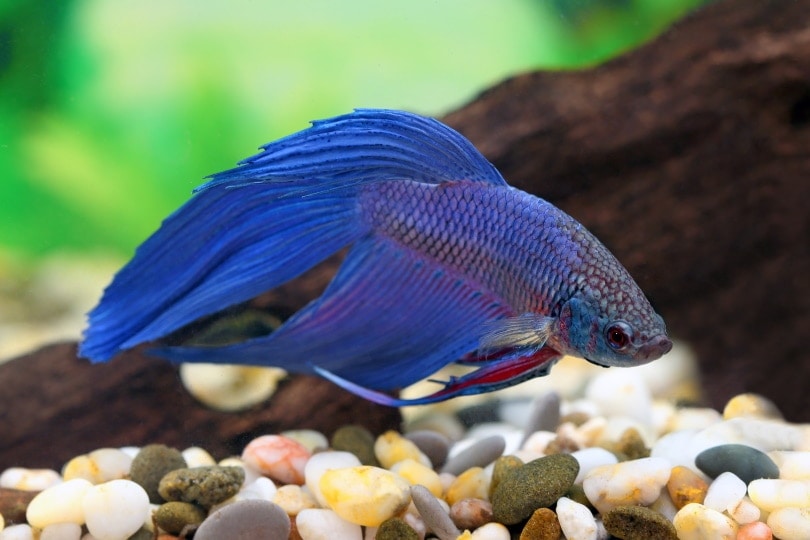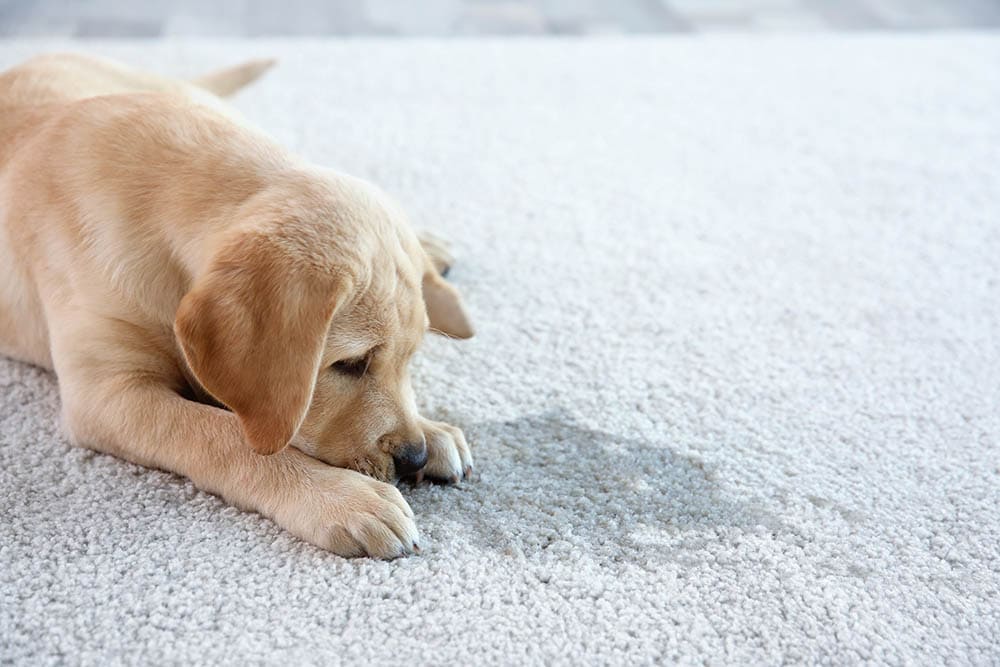Why Is My Cat Losing Hair? 14 Potential Reasons (Vet Answer)

Updated on
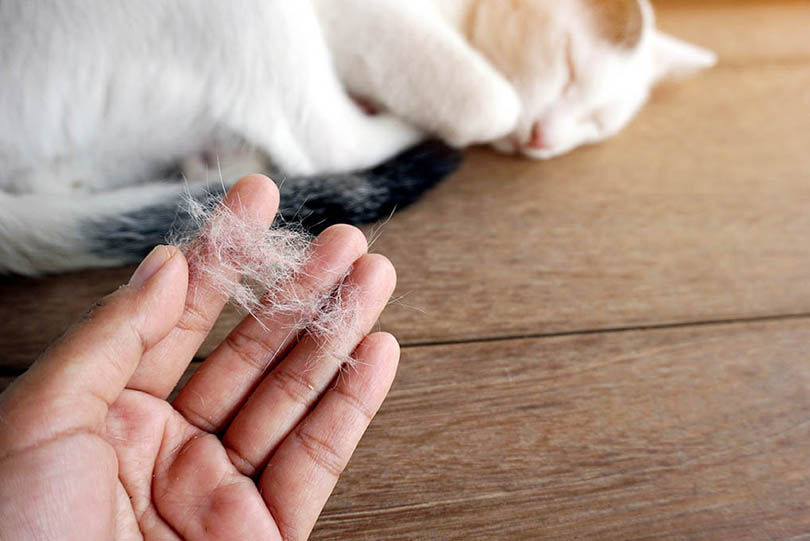
There’s a lot of reasons to love cats, whether they’re perfect pedigrees or magnificent moggies. One of the reasons they’re so great is their wonderful variety of coat colors. Not to mention the irresistibly cute way they groom themselves to keep their fur looking its best. But what if your feline friend’s glossy coat has seen better days? If your cat is losing hair, you might be wondering why and how to get them looking and feeling their best again. Well, read on to find out.
The 14 Potential Reasons Your Cat is Losing Hair
There are many reasons why your furry friend might be looking a bit, well, fur-less. Some of the causes need veterinary attention, whereas others could be completely normal for your kitty. The reasons cats can lose their fur include:
1. Fleas
Fleas are one of the most common causes of hair loss in cats. Sometimes it’s because there are so many fleas that your cat becomes intensely itchy, and their scratching damages their skin and fur. However, it’s far more common that your cat is allergic to flea saliva, so just a few flea bites can cause excessive itching. If your cat has fleas, you might spot them if you part the fur and look closely. However, even if you don’t see any live fleas, you might see tiny black specks of dirt, called flea dirt, which is a telltale sign.
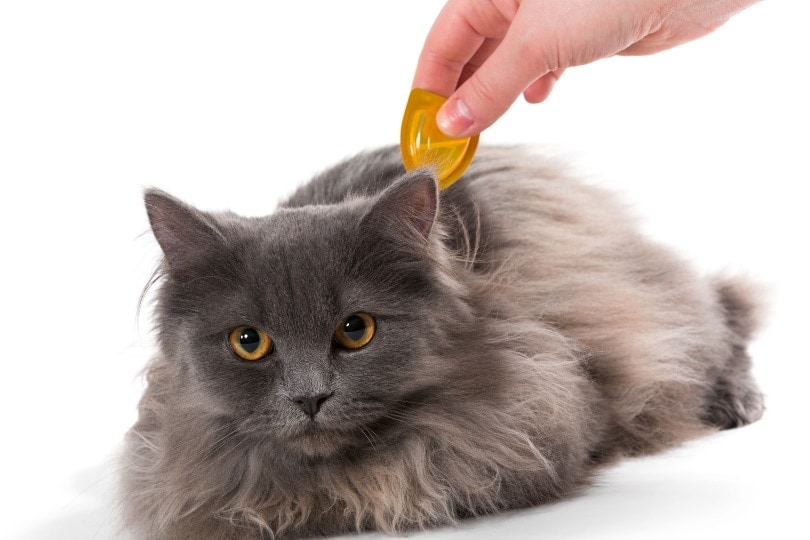
2. Other parasites
Fleas aren’t the only creepy crawlies that could cause your poor cat to lose their glossy locks. Other parasites like ticks, lice, and mites could cause your cat to scratch and lick at itchy areas, leading to hair loss. Ticks and lice can be seen with the naked eye, but your veterinarian will need a microscope to check for mites.
3. Ear mites
If your cat’s hair loss is just around their ears, it could be an indication that they have another type of parasite, ear mites. These crawly critters are especially common in young kittens and can be seen by your veterinarian under a microscope.
- Related Read: How to Tell if Your Cat Has Ear Mites in 4 Easy Steps!
4. Ear infections
Hair thinning or hair loss on the ears could also indicate that your cat has an ear infection. You might also notice the ears are smelly, look waxy, or have a brown or yellow discharge.
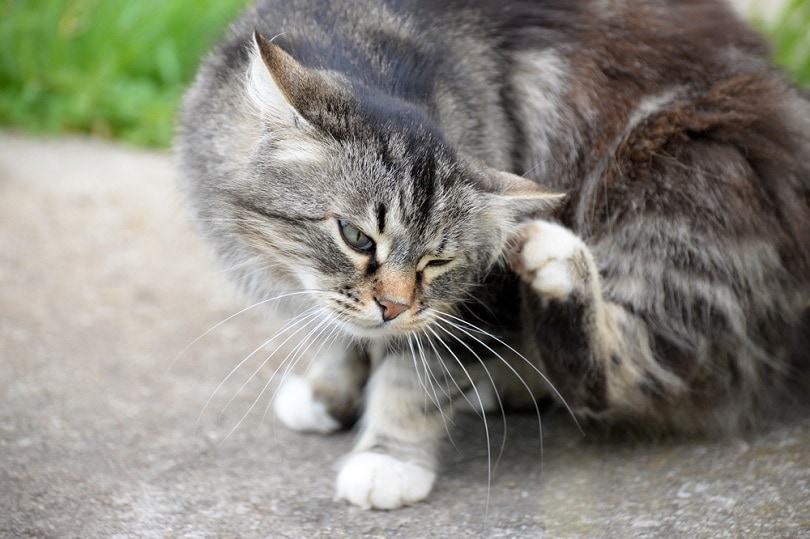
5. Stress
You might not realize It, but stress is a common cause of hair loss in cats. Cats are very sensitive, and seemingly minor changes can significantly affect them. Whether there’s a new kitten or baby in the household, or you’ve decided to go away on holiday, cats can become stressed and start grooming excessively. And it doesn’t have to be changes within the home itself; sometimes, a new cat in the area or some building work nearby can be all it takes to cause your cat stress. Cats have really rough tongues, so overgrooming causes damage to the hair shafts and can pull fur out altogether. It’s common for cats who overgroom to have bald patches or even sore areas where the skin has become traumatized.
6. Allergies
We’ve already mentioned the flea allergy, but other types of allergies can also cause your cat to lose their hair. Cats can be allergic to almost anything, but food allergies and pollen allergies are relatively common. Just as allergies can cause rashes in humans, they can also cause rashes, itchy skin, and hair loss in cats.
7. Ringworm
Ringworm is a type of fungal infection that can pass between animals and humans. Cats can be carriers of ringworm without showing any signs at all. However, it does occasionally cause them to get bald patches or thinning fur.
8. Skin infection
Skin infections, usually caused by bacteria, can cause your cat to become itchy and sore. As well as causing damage to the hair follicles and causing hair to drop out, it may also cause irritation that leads your cat to lick or scratch. This licking and scratching can cause even more hair loss. Sometimes skin infections can be smelly, and if your cat has one, you might also notice scabs or crusts on the skin.
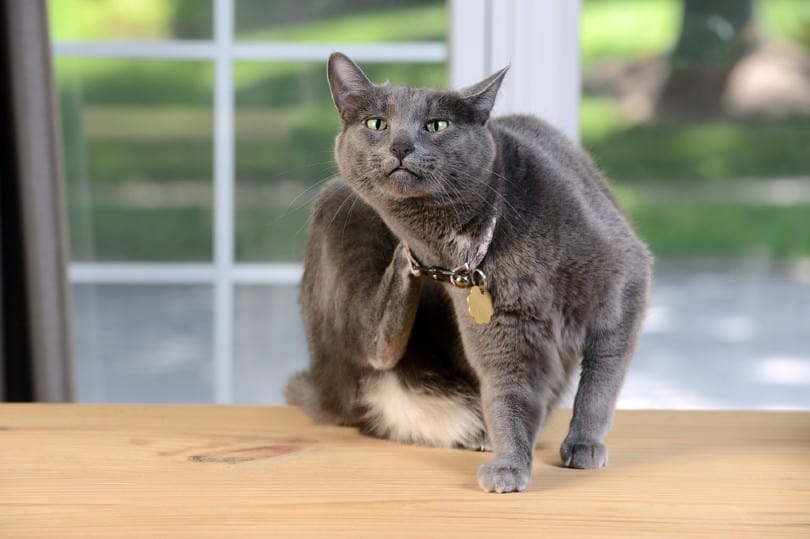
9. Pain
Any source of pain can cause your cat to lick or rub the area, leading to hair loss. This includes pain from arthritis, wounds, or other injuries and ailments. The hair loss might be focused around a joint or near an obvious sore spot but remember that the source of pain might not be apparent.
10. Hormonal imbalances
Hormonal health conditions can often affect hair growth and shedding cycles. One of the hormonal conditions that are common in older cats is hyperthyroidism. If your cat has hyperthyroidism, you might also notice them eating or drinking more than usual, and they might start losing weight.
11. Scarring
If your cat sustains an injury and is left with a scar, it’s usually the case that the scar tissue will remain bald. Don’t worry though, the skin around the scar will still grow hair and might cover it, depending on its size.
12. Pregnancy and lactation
Hormone changes, as well as the high demand for vitamins and minerals during pregnancy, can cause your cat to shed more hair. This can lead to thinning hair throughout their coat. You might also notice thinning fur around their mammary glands as they fill with milk. This is quite normal, and the fur usually grows back without any problem.
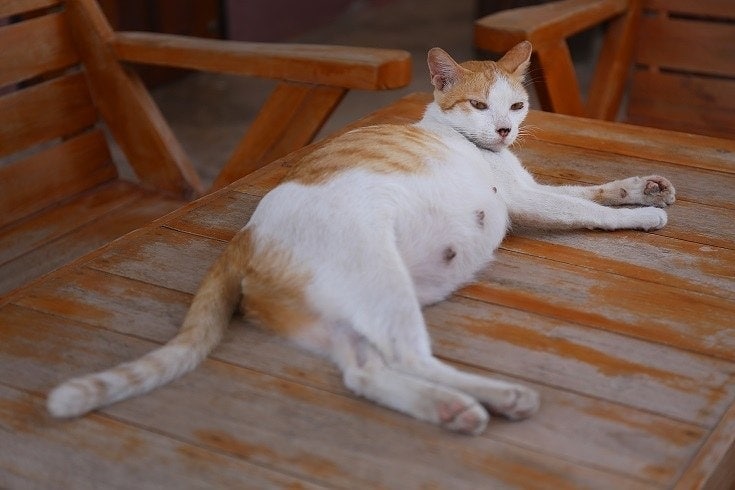
13. Genetics
There’s a wide range of normal when it comes to different cat breeds. For example, the Sphynx cat has no fur at all, and other breeds naturally have patches of thinner fur. Genetics can also cause your cat’s hair to fall out periodically, which can be normal in some cases.
14. Normal or seasonal shedding
Cats’ hair grows in cycles so that hair might be growing, shedding, or staying put at any point. It’s normal for some cats to lose more hair when the weather warms up, and they lose their winter coat. As long as you don’t notice any bald patches, shedding is usually nothing to be concerned about.
Tired of seeing loose hair floating around your house? We’ll let you in on a little secret to keep shedding to a minimum: the Hepper Cat Brush.
- ONE PUSH RELEASE - This kitten brush / cat brush pops out fur with just a simple press, leaving you...
- DURABLE - Cat shedding can be a tough ordeal. Made of resilient ABS plastic and metal bristles with...
Created to be gentle on your cat’s skin while removing excess hair, this brush is perfect for weekly grooming sessions and keeps loose fur to a minimum. This is our product, so we might be biased, but we love it so much we had to share!
When to see a vet about your cat’s hair loss
If your cat seems happy, has no other symptoms, and has no bald patches, they might not need to see a veterinarian right away. If they are pregnant or have recently had kittens but are otherwise well, it’s unlikely to be anything to be concerned about either. If they seem itchy and haven’t had a flea treatment for a while, it’s worth checking for fleas and applying a parasite treatment. However, if they seem painful or anxious or show any signs of being unwell, it’s best to take them for a check-up.
How will your veterinarian determine the cause of your cat’s hair loss?
Your veterinarian can do various tests to find out the cause of your furry friend’s hair loss. They’ll start by doing a thorough examination from head to toe. They might recommend taking hair plucks, swabs, or skin scrape samples to look at under the microscope or send to an expert laboratory. These samples can be used to check for parasites, ringworm, or bacteria. If your veterinarian suspects an overactive thyroid, they might suggest performing a blood test. In rarer cases, they might suggest taking a skin biopsy or referring your cat to a specialist dermatologist.

Treatment options for hair loss in cats
Of course, the treatment that your veterinarian recommends will depend on the cause of your cat’s hair loss, and some cats won’t need any treatment at all. If stress is the suspected cause, your veterinarian might prescribe anti-anxiety medications or suggest using a calming spray or diffuser. They might also talk you through how to minimize the impact of any stressful changes around the house.
If your veterinarian thinks that your cat might have an allergy, they might prescribe anti-inflammatory or anti-itch medications, as well as advising you how to manage the allergy long term. Your veterinarian can also prescribe pain relief medication, parasite control, antibiotics, or anti-fungal treatments, depending on the underlying cause of your poor pet’s fur loss.
 So, should you be worried if your cat is losing fur?
So, should you be worried if your cat is losing fur?
If your cat’s fur isn’t looking as full-bodied as it used to, it’s usually worth getting them checked out by a veterinarian. If they are well and the skin isn’t damaged, it’s worth checking for fleas first in case a simple parasite treatment could solve the problem. However, skin irritation or even painful sores can be a consequence of some causes of hair loss, so it’s best not to delay getting veterinary help. Once the cause of your cat’s hair loss is identified and treatment has begun, it shouldn’t be too long before your feline friend is back to their furry former self!
Featured Image Credit: Doucefleur, Shutterstock




 So, should you be worried if your cat is losing fur?
So, should you be worried if your cat is losing fur?